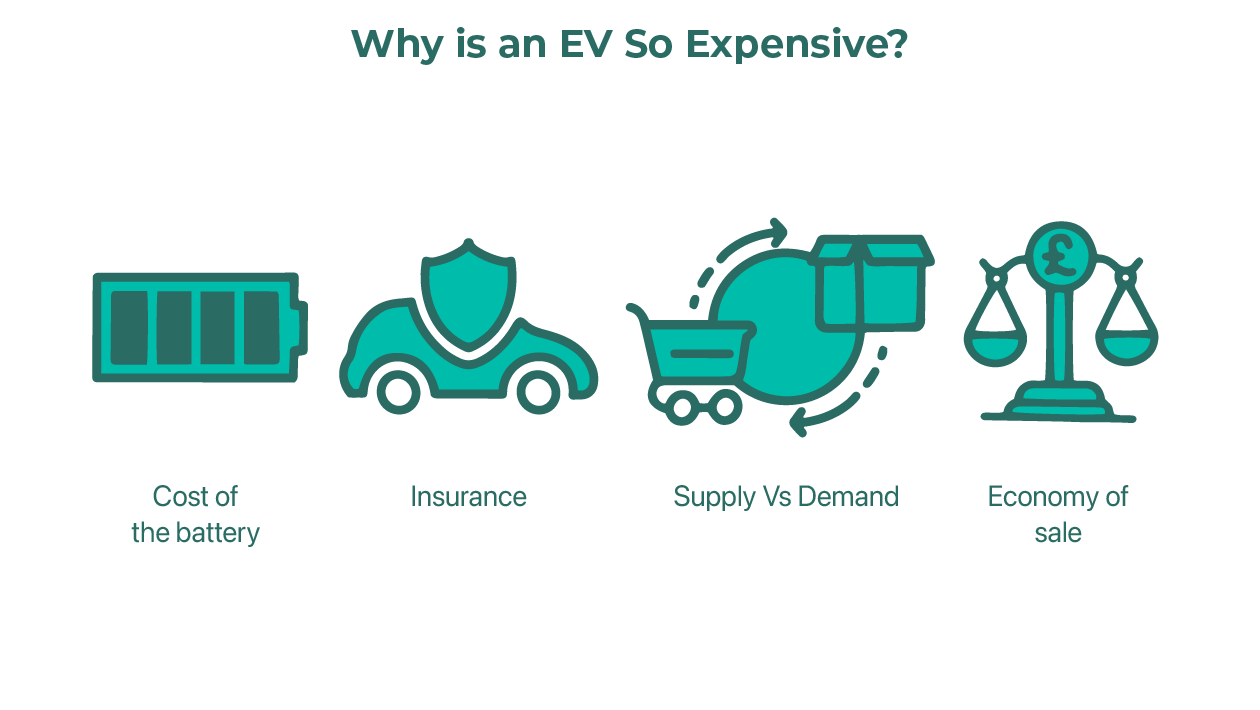
Why are Electric Vehicles so Expensive?
We explain why electric vehicles can cost more than their petrol and diesel counterparts.
Buying a new car comes with the expectation of a high cost. But electric vehicles, the newest trend taking the automotive industry by storm, seem to be even more expensive.
Why are electric vehicles so expensive? And will you save money in the long run?

4 Reasons Electric Vehicles are Expensive
1: The Cost of the Battery
EVs use lithium-ion batteries, which require expensive materials to make – much more expensive than the materials that are used to make ICE (Internal Combustion Engine) vehicles.
Prices of lithium batteries have dropped over the last decade and research is being done into finding cheaper alternatives – but at the moment, the cost of the EV battery remains high.
2: The Cost of Insurance
Electric vehicles cost more money to insure for a few reasons. They’re still a fairly new development in the automotive industry, so the research which has been conducted is limited. The parts for EVs are also harder to source, as are the mechanics who know how to fix them.
The fact the cars cost more themselves also means that the price of insurance is higher.
3: The Supply Doesn’t Meet the Demand
Lots of people want EVs - they’re new, exciting, trendy, and good for the environment. But the manufacturers simply can’t produce them fast enough to meet the demand of potential customers due to the lengthy production times.
It can take up to 18 months to produce just the lithium battery, meaning it takes longer to build an electric car than it does to build an ICE vehicle. This all contributes to why electric vehicles are so expensive.
4: Economies of Scale
To put it simply, the more of something you make, the cheaper it becomes to make each item. Due to the fact electric vehicles aren’t produced on the same scale as ICE vehicles (see point above) they are much more expensive to produce. This means they are still much more expensive to buy.
Are Electric Vehicles More Expensive in the Long Run?
Although the upfront cost of buying an electric vehicle is more expensive than its petrol or diesel counterparts, you could save money on running costs.
You don’t have to pay road tax on electric vehicles, since this is calculated based on the amount of emissions your car produces (an EV produces none). The UK Government offers a variety of grants for EV drivers to help with costs such as charging points and the vehicles themselves. You will also not have to pay congestion charges in London and other cities with Clean Air Zones.
Depending on your situation – how much you drive, where you drive, and what you drive - you could end up saving yourself some money. Just because you no longer need to buy petrol, it doesn’t mean that you’re driving your EV for free. The cost of public charging points differs greatly depending on where you are.
Charging your vehicle at home from the mains could cost you around £15 in the UK, but this takes longer than if you were to use a proper charging point. If you’d like one of those installed, it could cost you upwards of £800.
However, there are many free charging points around the UK, and you can get a decent amount of miles from one charge. There are apps and websites such as Zap Maps that can help you source free charging points.
Read More
How Much Does an Electric Car Cost?
If you’re starting to think about plugging into the electric revolution, you need to know what sort of budget you need before you can commit. Find out how much electric cars cost in this guide.
How Much Does It Cost to Run an Electric Car? (Vs an ICE)
Before you commit to buying an electric car, you need to know how much it costs to drive one day-to-day. Read this article to learn more about electric car running costs, including insurance, servicing, tax, and charging.
How Can I Afford an Electric Car?
As electric cars are still so expensive, many drivers are worried about how they can afford to own an EV. In this article, we discuss what finance options are available, the Government grants and other ways to own an electric car.